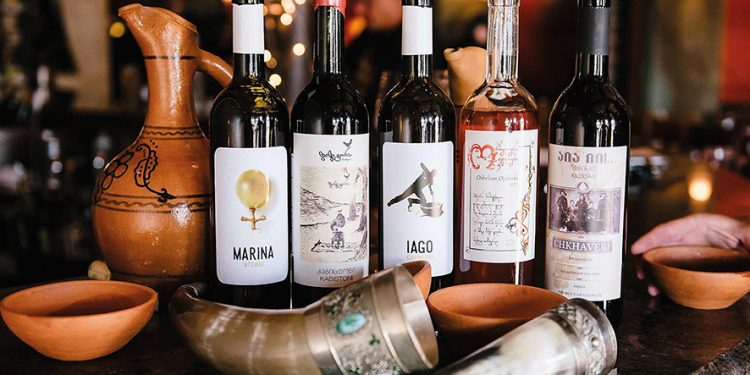Wine is a big deal in Georgia, though, regrettably, it is not quite such a big a deal in the international marketplace. Why? Not easy to answer, but trying doesn’t hurt.
The story has it that Georgia is a land of vine and the cradle of wine, but being the birthplace of this divine Georgian beverage does not mean at all that it is the most popular brand of its kind in the world. The quality of a thing does not always determine the scope of its proliferation, and this is the case with our beloved and venerated Georgian wine.
The extant archeological findings readily corroborate Georgia’s claim as the world’s most ancient wine-making country, the product’s history taking us back to 6000 B.C. Certainly, the climate and the terrain both helped us to harvest enough grapes to produce ample quantities of wine to push into the markets of the vicinity, among these Babylon and Ur of the Middle East. Historically speaking, Georgia would even pay due tribute to dominating countries in wine, and the conquerors would accept it with unconcealed felicity. The experience of that length and caliber makes us one of the most attractive grape winemaking locations in the entire world, but there is one paradox that has a tendency to make us feel nervous: The older our recognized skills and knowledge in the trade, the harder it becomes for us to tolerate the fact that other nations, with fewer historical assets, are making more money in today’s wine industry than us.
The frustration is totally understandable, but is no help at all: The past is the past, and while it is a valuable precursor to the present, appreciating future success is even more precious. Part of this nation’s lasting spirit is that it has never ceased in its unremitted production of wine, even when vicious invaders tried on numerous occasions to uproot forever the life-giving vine from our fertile soil.
Last year, the export of Georgian wine grew by 6.2%. Monetarily speaking, the total wine export was worth more than $201 million
Wine has driven the Georgian economy to a certain extent, and is still driving it. New markets and opportunities are being explored and conquered within the available capacities and capabilities, but the question is if there is any room left to let Georgian wine make more money for the country. The world’s wine scene is overflowing with the product, and operating within that implacable trade network is more than difficult no matter what kind of a quality we are ready to bring into the Bacchus-dominated battlefield.

Hopefully, the process of revitalization of the cherished national heritage is gathering momentum, which means that it is acquiring a realistic chance to have an actual effect on the Republic’s state budget. The producers of the most distinguished indigenous wines should feel obligated to help their products become as recognizable as possible worldwide, among them one of the largest and most productive national wineries, Khareba, and others of the same magnitude and quality.
Last year, the export of Georgian wine grew by 6.2%. Monetarily speaking, and based on the official statistical data, the total wine export was worth more than $201 million. This figure speaks volumes about the increased production and augmented chances of trade. Especially mature is the export of wine to Russia, followed by Poland, which has overtaken Ukraine for clear reasons. Third in terms of imported Georgian vintage wines comes China.
One of the most challenging goals in wine production and its vast commercialization is the diversification of markets. We are still very dependent on the Russian market, which is nothing to be ashamed about because common sense should not confuse political and commercial goals and aspirations. It is also a fact that the Russian share in the market is gradually decreasing thanks to the growth of the number of countries interested in Georgian wine, their part of the purchase growing on an everyday basis. The figures will become even more impressive provided that free-trade agreement is signed with the United States of America. The current negotiations with Moldova on the same topic will have an influence too.
Where in 2021, we had only 962 exporting companies that sent their products to the EU, the number is expected to have increased by 30% in 2030
The process of promoting Georgian companies oriented on economic integration with the European Union and on the development of export-import endeavors in the same direction, is being invigorated. For instance, based on the official prognosis, where in 2021, we had only 962 exporting companies that sent their products to the EU, the number of such companies is expected to have increased by 30% in 2030. This is an overall figure, within which the space up taken by the wine sector is quite considerable.
To conclude, it is not only the export opportunities that are going through a metamorphosis, but also the overall attitude of our society to wine: We are getting used to buying and consuming a huge variety of expensive vintage wines, no longer satisfied being mere drinkers of home-made, cheap wines; we are learning to train our taste for higher-quality wines, confirming our civilized attitude to wine in general; appreciating not only the quantity of the imbibed beverage but its quality too.
Op-Ed by Nugzar B. Ruhadze














